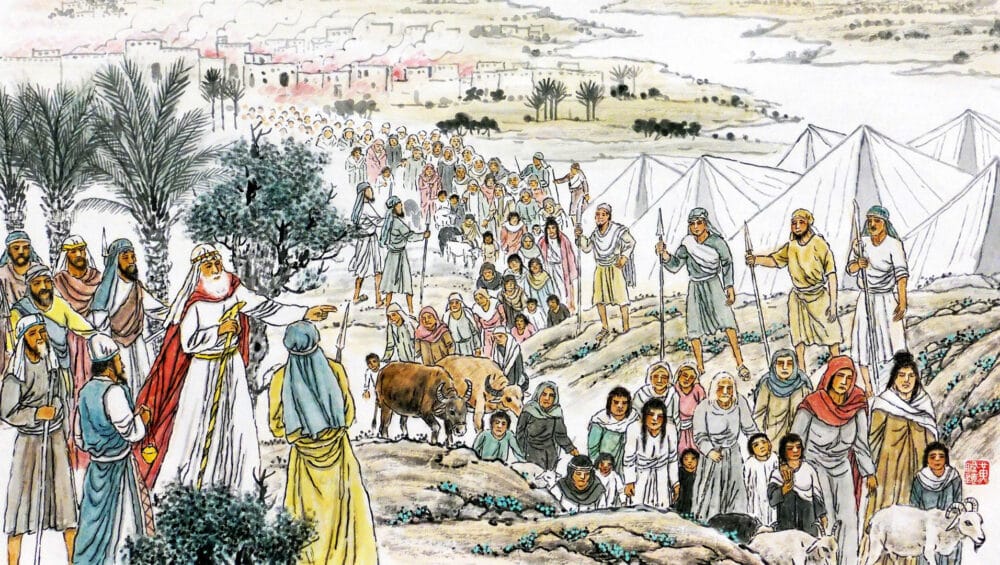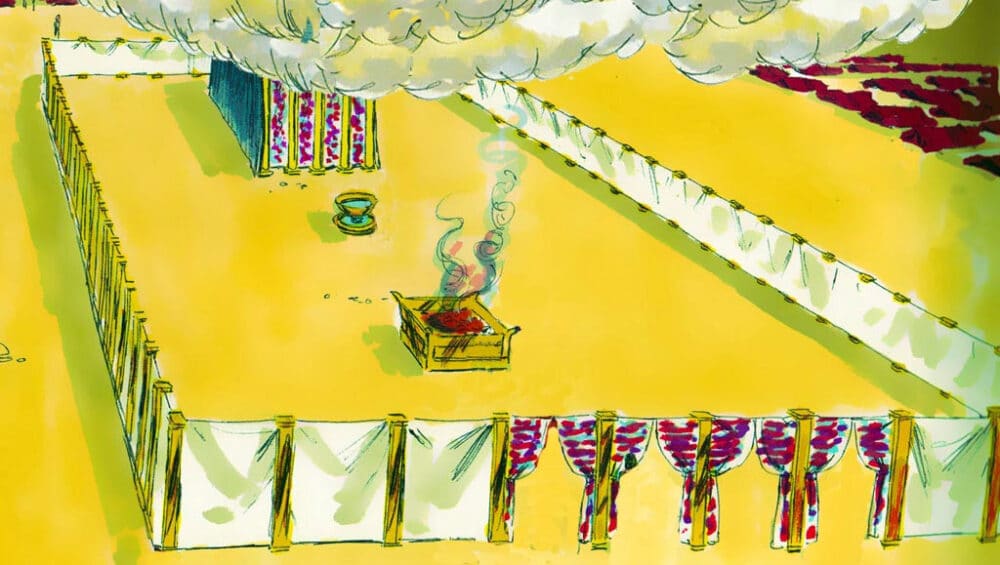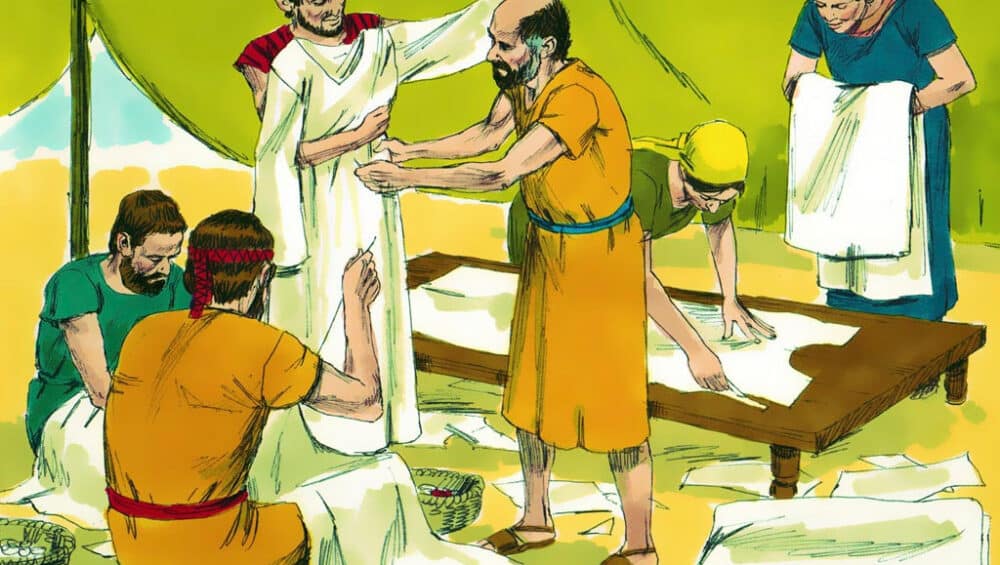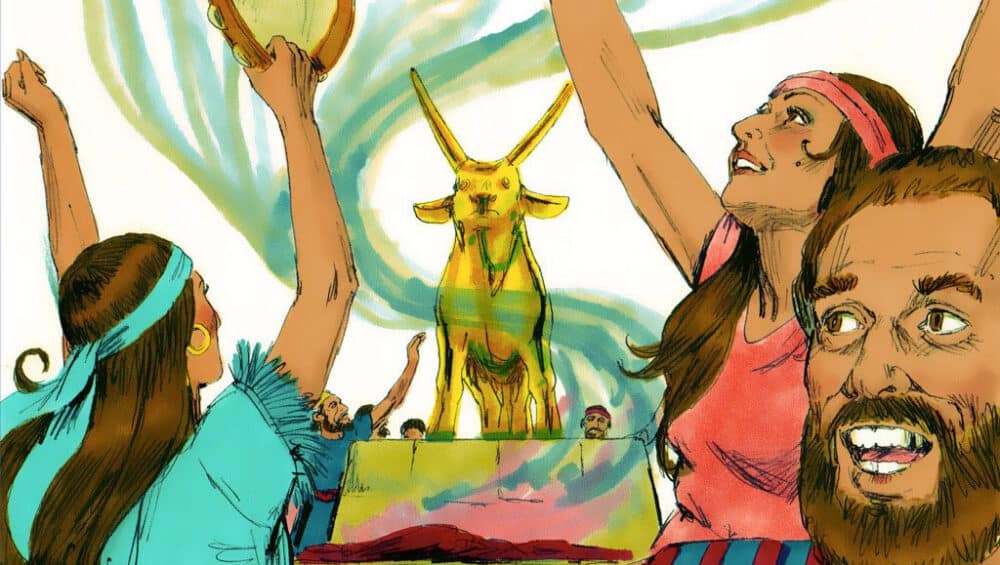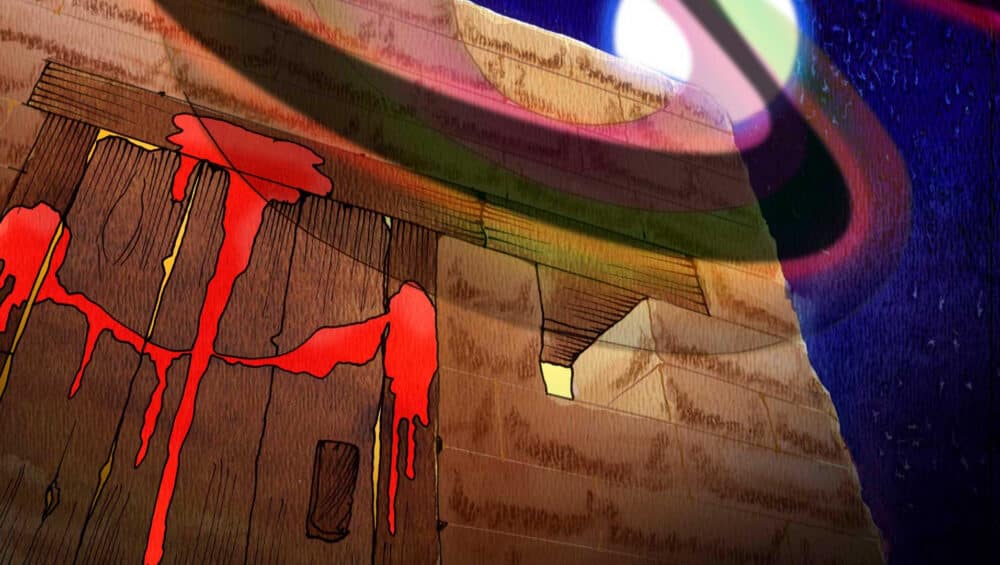Welcome to Livin’ Light’s Bible-In-A-Year challenge of discovering God’s love for us and His purpose for our lives. Here is the format for this great adventure: The daily reading assignment is posted at 5 a.m. After each day’s reading, Leigh An Coplin, the blog host, shares observations and poses questions about difficult passages to Rob Fields, who studied Christian Education at Asbury Seminary and currently teaches Biology in the Orlando area. To start from the beginning, click on 365 Bible Readings and scroll down to Day 1. The reading schedule is taken from The One Year Chronological Bible NLT.
Today’s Reading
— Exodus 10-12 (1446 BC) Click here for a timeline of the whole Bible.
Questions & Observations
Q. Rob, in one of your answers yesterday, you said, the Bible “does not shy away from saying that there are no other spiritual powers that can be used, only that God is superior to them.” Does the Bible say other deities are real or are you just saying that there are spiritual powers out there and they elude to that they come from Satan?
A. The Bible does not answer that question directly. Instead, it orders that God alone should be worshipped, and distinguishes between the true God and false gods. Whether these “false gods” exist could, I think, be interpreted either way.
As you enter the New Testament, I think that you move more and more towards the concept of there is only one God (i.e. all other gods are false), but it certainly does not deny the existence of other spiritual powers such as demons.
Q. (Exodus 10:1): I said that I’m not going to question God so much, but it’s so hard not to. I’ll go on the offensive rather than defensive. Here, it sounds like God caused all this devastation to show His people His power and that they should follow Him. And He is there to protect them and fight their battles. Maybe it’s showing them more of what is coming their way — they will need to rely on God to survive their journey? Also, the Egyptians, at least the Pharaoh, did not follow God, so maybe God just decided to play with them for a little bit. He’s giving the Egyptians payback?
A. God appears to be avenging the suffering that Egypt has inflicted on their Israelite slaves, which are His chosen ones. In the process, He is teaching the Israelite people that He is faithful and should follow Him.
Q. (10:4): Is there any significance with locusts in the Bible? Here a plague, but also Jesus eats them in the wilderness, right?
A. John the Baptist ate locusts in the wilderness. Locusts were (and are) a real problem in the world, and one of the most real examples of a plague on agrarian society. If you are dependent on crops, and the locusts eat all those crops, you’re in big trouble. So locusts are seen as a plague of judgment (here, in Joel, and in Revelation, there may be others), sometimes against God’s enemies, and (in Joel) against God’s people.
Q. (10:14-15): How could the Egyptians survive? There is nothing left. Pharaoh would have to be so frustrated that God kept hardening his heart. He has no food left! God seems to be having fun with Pharaoh. In our small group, we had a discussion about God does things to bring glory to Himself. I had never heard this before. I thought it was kind of egotistical. But, here we see it plain as day that God is deeply demonstrating his power to the Egyptians to show the Egyptians how glorious He is. I guess my question here, is how could the Egyptians want to continue this torture?
A. It’s clear from the story that even those closest to Pharaoh were begging him to get rid of the problem people, but they ultimately, had to submit to whatever their king decided. Since the Egyptians were seen as such an enemy of the Israelites, it appears that their survival was not a priority of the story. I don’t honestly have a better idea of how to answer the question than that.
Q. (10:16-17): Again, we see repetition after repetition in these plagues. We saw it in Job, we saw it when Abraham asked God to spare the righteous in Sodom. I guess it’s all for emphasis, to make sure we understand God’s point. On a personal note, I think about how many times something has to happen before I change it for the better and make it a habit. I keep drinking coffee even though it makes me on edge and sluggish the rest of the day. I’m working on it. There are numerous things in my life like that. You? I guess it’s the hard-headedness. Has God hardened our hearts so it’s a real challenge to choose to follow God?
A. This appears to be a special circumstance, for this type of phrasing (hardening the heart) is not used again. It appears that this story is meant to be unique. One change that takes place in the midst of the story of Christianity in the NT is that the Spirit becomes a living presence in the heart of believers. That presence of God in our hearts is one that always desires to bring us CLOSER to God, not to harden our stance away from Him. So, I would say you as a Christian (rather than one who is counted an enemy of God) has anything to worry about from God hardening your heart against Him.
O. (11:4-6): I wonder how Moses felt to be the one warning about these plagues and giving God the “go” signal with his staff. This was a guy who had run away from Egypt because he was afraid he would be killed for murdering an Egyptian, then he kind of hid as a shepherd. And finally, he begged God not to make him leader of the Israelites. What a change for Moses!
Q. (12:5): I struggle with this because God asks for animals with no defects and that they be one year old. What is the significance of this? I thought his creations were equal. I guess I’m thinking of man. From what we have read, he does not give priority to those humans who are near perfect. But, for sacrificial animals, the Lord wants the best? I guess animals are different from humans in that regard? As a vegan, the whole sacrifice thing is never going to be easy for me to swallow. Pun intended!
A. The significance of the one-year-old animal without a defect is the sacrifice would be required on the part of the sacrificer. You couldn’t give God just any old (or sick, or deformed) animal. You had to provide an animal in its prime, not one you were going to get rid of anyway. This goes back to giving God our best or “first fruits”.
Q. (12:8): Why bread with no yeast? Takes up less space for traveling?
A. Nope. It’s ready sooner because you don’t have to wait for it to rise.
Q. (12:23): I never thought about the OT blood symbolism applying to Jesus dying on the cross. Just as the blood allows God to spare the Israelites from the plague, Jesus blood shed spares us from eternal punishment. Does this work for you, Rob?
A. Yes. When John the Baptist speaks of Jesus as the Lamb of God in John 1, I suspect this is at least partially the image he had in mind. The idea here is that the blood itself is what wards off the angel of death, an idea that Christians definitely came to connect with.
Q. (12:24): I guess this is speaking to us. Christians are still supposed to observe the Passover? I never have. It has not been a requirement in the churches I have belonged to.
A. We are no longer under the Law, so we are not obligated to keep the Passover. This does not mean we cannot participate in one or learn from it. Something I have seen recently in the churches I have been a part of have connected with the idea that the Last Supper from the Gospels was, in fact, a Passover meal. Jesus took the opportunity do use the unleavened bread (which, for reference, is kind of like pita bread) and wine that were already a part of the ceremony to talk about the new way God was doing to do things through Jesus (i.e. the new covenant). So, while we don’t HAVE to keep the Passover, I think there is great value in understanding it, and maybe sharing in one at some point.
Q. (12:48): Sure glad I’m a woman! Does the Passover law still apply — that all males who want to partake in it must be circumcised?
A. Ha! For religious Jews such as Hassidic and Orthodox, I presume the answer is yes, but I am not certain.
Q. (12:51): Leading the Israelites out of Egypt would be quite an undertaking for Moses. With women and children, there were easily 2 million Israelites. Moses didn’t have a microphone. How could he communicate what they were to do so quickly? Nothing is impossible with the Lord!
A. One of the things that the text will talk about after the journey to Sinai is the way that the different tribes moved with the Tabernacle. Nope, no microphones, so I would imagine it was an incredibly difficult task: something God alone could bring the people through.
Further reading: Were the Israelites in Egypt when the Bible says they were? https://christiananswers.net/q-abr/abr-a027.html
Shop: God takes care of those who trust in Him. God is good!
Tomorrow’s reading: Exodus 13-15

